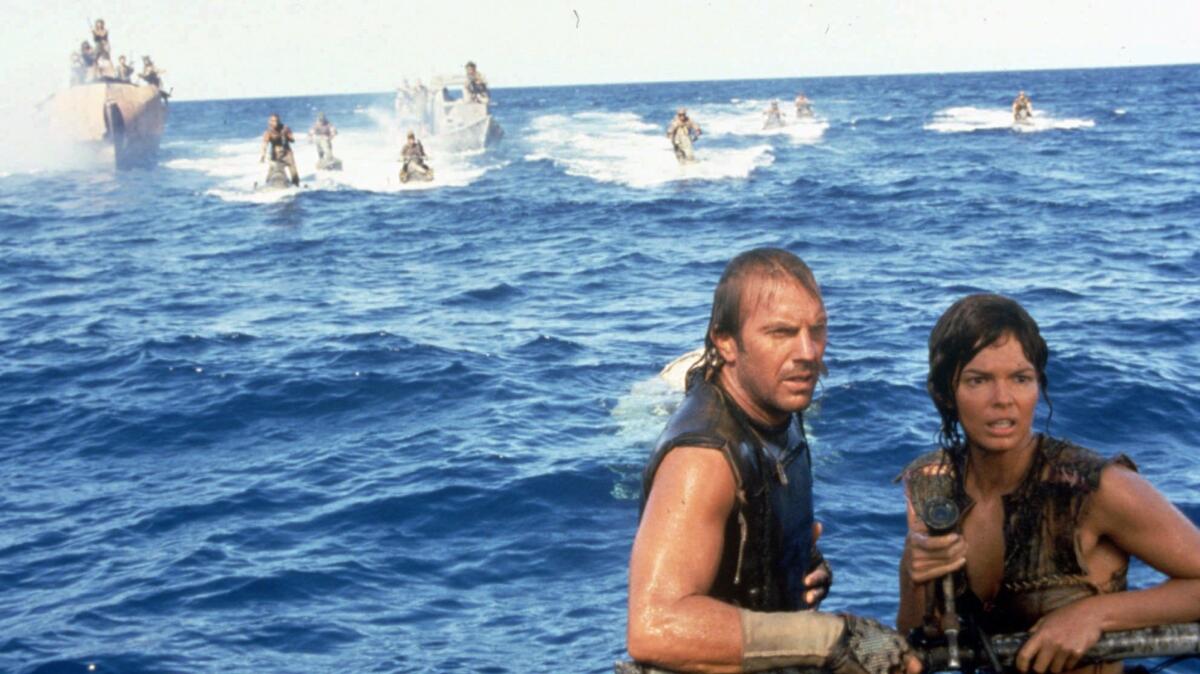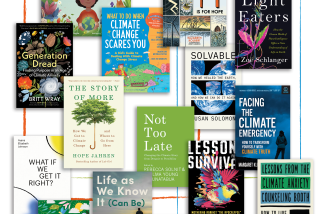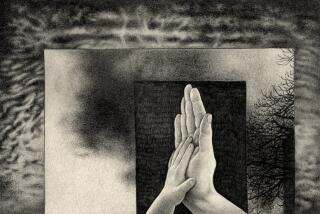Considering ‘Mad Max’ and other Hollywood dystopias after Trump’s exit from Paris accord
Since the plagues of the Old Testament, we have contemplated the Apocalypse, the world rising in vengeance as men, women and children scurry across the brutal landscape of a lost paradise. Skies rain hail, locusts swarm, rivers turn to blood, darkness falls.
Our doomsday stories and how they scroll and flash before us have changed since the parchment days of the Bible. But we remain fascinated by the specter of our demise, whether the end is wrought by deities, our own folly or imposed by outside forces like monsters, asteroids and aliens that have haunted us since Orson Welles’ 1938 “War of the Worlds” radio broadcast.
Few of our dystopias, however, are as frightening as the planet gone asunder, polluted and destroyed by humanity’s amorality, recklessness and greed. Film and literature — to say nothing of our private insecurities — resound with a world that freezes, boils, chokes, cracks with earthquakes, dwindles with resources and succumbs to pestilence and disease.
Film and literature resound with a world that freezes, boils, chokes, cracks with earthquakes, dwindles with resources and succumbs to pestilence and disease.
Images of glacier walls crashing into oceans, arid lands, smudged skies and Hollywood disaster scenarios have reverberated across social media since President Trump withdrew the U.S. from the Paris climate accord. The president said the pact, signed by 195 nations to reduce carbon emissions, would undercut business, hurt American workers and “weaken our sovereignty.”
“The Paris Agreement handicaps the United States’ economy in order to win praise from the very foreign capitals and global activists that have long sought to gain wealth at our country’s expense,” said Trump. “They don’t put America first. I do. And I always will.”
Perhaps more than any other moment in his presidency, Trump’s action highlighted a Darwinian world view in which the planet is less a community than an unforgiving marketplace for countries to compete and barter. Terrorism, Russia’s cyber meddling in the U.S. election and the nuclear ambitions of North Korea, whose leader Kim Jong Un taunts like a despot in an end-of-days movie, have unsettled Americans. But exiting the climate pact has raised larger existential questions at a time of rising seas, droughts and melting ice caps.
Hollywood for decades has spun science fiction and horror out of environmental calamity. In 1973, the thriller “Soylent Green” ventured to the year 2022, when the Earth was endangered by pollution and the greenhouse effect. Natural disaster movies related to climate change and pollution became a staple, including “The Day After Tomorrow” (2004), about storms raging across the globe in a new ice age, and the Mad Max series going through “Mad Max: Fury Road” (2015), where roving clans fight over gasoline and water on a crazed and poisoned Earth.
These stories foreshadowed and articulated the anxieties of a new century marked by wars and multiplying images of environmental degradation. The planet seemed to be shrinking, and every click of the screen — every YouTube rant, beheading, cyclone and story uttered — made us intimate with the ills that for so long seemed foreign and safely beyond our borders.
The world in these films is dark and unredemptive, a landscape of memory and rage where pictures of beaches and fields of green are eerie artifacts of humanity’s hubris and capacity to imperil what gives it life. Man becomes cast against himself in a cruel struggle for survival, such as the father and son who roam, scavenge and hide beneath slate skies in “The Road” (2009). The mood and tone are similar in “Children of Men” (2006), set in a desolate and violent London after pollution and other evils, which prove just as devastating as an asteroid strike, have rendered humanity infertile.
As the science of global warming has matured, and documentaries like Al Gore’s “An Inconvenient Truth” (2006) have explored its devastating consequences, the planet’s frailty has come into sharper focus, even as many Republicans, including Trump, question the causes that could spell our undoing. That dilemma and Trump’s decision on the Paris treaty will figure in Gore’s upcoming follow-up: “An Inconvenient Sequel: Truth to Power.”
The preoccupation over the planet’s future and its increasing interconnectedness have, according to novelist Junot Diaz, made dystopian themes “the default narrative of the generation.”
“The steady drum beat of reports from our best and brightest scientists has made it explicitly clear that, whether we like or whether we want to admit it or not, we have damaged our planet in ways that have transformed us into a dystopian topos,” he said in a podcast with the Boston Review. “We are making the genre in which we are living, and we are making it at such an extraordinary rate.”
Trump’s election and the bitter political and societal chasms it revealed has brought back into vogue a number of dystopian novels, including George Orwell’s “1984,” Philip Roth’s “The Plot Against America” and Margaret Atwood’s “The Handmaid’s Tale,” the story of infertility and turning women into slaves, which has been adapted for a heralded Hulu series. As in “The Road,” the exact cause of cataclysm in “The Handmaid’s Tale” is nebulous, a frightening, creeping concoction that plays with our imagination.
There is little doubt about the cause of ruin in “Chasing Coral,” a Netflix documentary on climate change and the death of coral reefs. The film, which opens in July, focuses on how warming waters around the Great Barrier Reef in Australia are bleaching the reef’s colors — imagine a rainbow turning to ash — and ability to sustain life.
“Our oceans are dramatically changing and we are losing coral reefs on a global scale,” director Jeff Orlowski said. “We spent three years with divers, underwater photographers and experts to reveal the majesty of our oceans and the rapidly changing reality of our world. What we witnessed while making this film reshaped my understanding of the world.”
The film is likely to intensify the debate around global warming and how filmmaking and other arts challenge and speak to conflicting agendas. A timely, if seemingly satirical, blurring of the lines between our fictions, politics and realities comes to mind in “Dystopian Visions,” a new class former presidential candidate Sen. Rand Paul will teach at George Washington University.
Such visions haunt and often remind us of nature’s splendor and fragility, and what happens when species go extinct and winds howl arid and foul. They also leave us (and Hollywood) with questions: How does one generation explain to the next that their birthright is jeopardy? That chaos sprung from folly or chance is irreparable, and that destiny is bound in dereliction?
In her 1826 post-apocalyptic novel about a plague, “The Last Man,” Mary Shelley, who also gave us “Frankenstein,” pondered: “What is there in our nature that is forever urging us on towards pain and misery?”

Kevin Costner’s interminable “Waterworld” (1995) imagined a planet where the polar ice caps melted and everyone lived on ships and floating outposts, hoarding jars of dirt like relics while searching for mythical dry land. In “Blade Runner” (1982), a revolutionary work by director Ridley Scott, Los Angeles of 2019 is a garish and desolate landscape where cops battle synthetic humans known as “replicants.” Earth has become shades of grays and neon, tree-less and shadowed by Orwellian industrial towers. Not surprisingly, a sequel, “Blade Runner 2049,” will open this year.
But man is a creature of hope, cunning and delusion. Waste a planet, find an escape; or in biblical terms, endure banishment from the Garden of Eden. That is the theme of “Interstellar” (2014), when a team of astronauts seeks a wormhole in space to deliver humanity from the shriveled crops, blowing dust and the environmental catastrophe Earth has become. It seems our ingenuity to find someplace new is stronger and more fierce than it is in fixing the place we are.
“We didn’t run out of planes and television sets,” says one character, “we ran out of food.”
That is too pessimistic an epitaph for many Hollywood films, where even in demise there’s a promise of resurrection. A scientist played by Michael Caine, whose soothing voice can make a lie sound like the truth, adds: “We’re not meant to save the world. We’re meant to leave it.”
See the most-read stories this hour »
Twitter: @JeffreyLAT
ALSO
Ethan Hawke lets us in his editing room and reveals what Philip Seymour Hoffman taught him
Racing through Rome before the ticket booth goes dark and other faraway moviegoing adventures
More to Read
Only good movies
Get the Indie Focus newsletter, Mark Olsen's weekly guide to the world of cinema.
You may occasionally receive promotional content from the Los Angeles Times.










